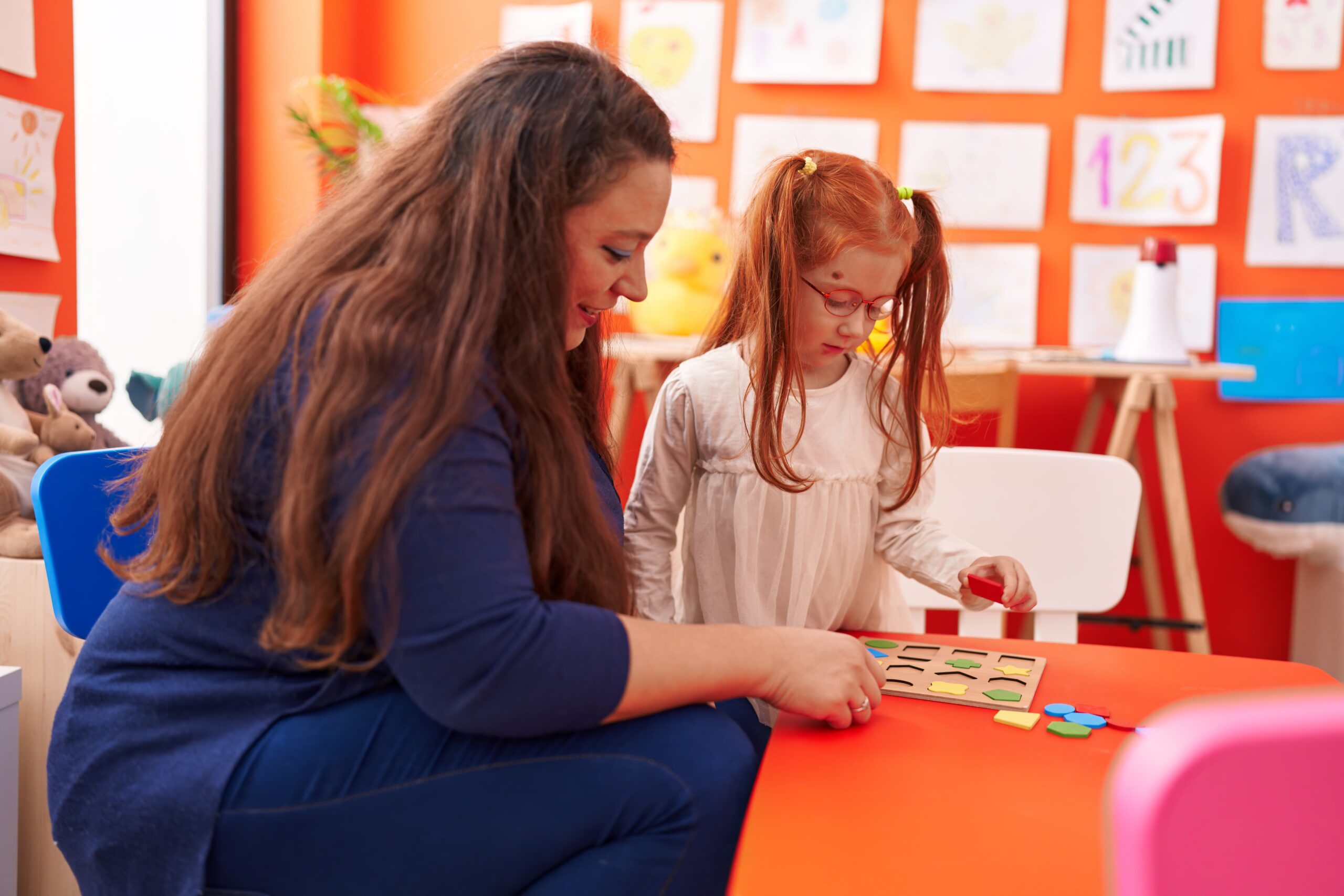Key Points:
- ABA therapists work closely with teachers and school staff to support students with autism throughout the school day.
- School-based ABA therapy enhances classroom learning by reinforcing academic, behavioral, and social skills.
- Consistent communication and clearly defined roles between ABA providers and educators ensure effective autism support in schools.
When a child with autism begins school, parents often worry: Will they get the support they need? Will the strategies we’ve worked so hard on at home carry over into the classroom? These concerns are real and valid. The good news is that ABA therapists can and do collaborate with teachers and schools to create a seamless support system for your child.
Applied Behavior Analysis (ABA) is a structured, evidence-based approach that focuses on improving meaningful behaviors. While many people associate ABA with home-based therapy, its impact inside school settings is just as significant, if not more critical, for children navigating academic and social environments daily.
This article explores how ABA therapists work with teachers and school staff, what this collaboration looks like in practice, and what parents should know to ensure their child receives effective ABA therapy in schools.
Why Collaboration Matters: Building a Bridge Between Home, School, and Therapy
Children with autism thrive on consistency. When teaching methods, behavioral expectations, and supports are aligned across all environments – home, therapy, and school, their progress tends to be faster and more meaningful.
That’s why a collaborative approach between ABA therapists and educational teams isn’t optional. It’s essential. Whether it’s through school-based ABA therapy during the day or after-school ABA therapy sessions that align with school goals, having open communication between providers and teachers ensures no one is working in isolation.
For many children, the school is the primary place where they practice social interaction, learn academic skills, and navigate routines. ABA therapists can help make those experiences more successful.
ABA Therapy in Schools: What Does It Actually Look Like?
ABA therapy in schools involves structured behavioral support delivered in the classroom, in one-on-one sessions, or in small group settings—depending on the child’s needs.
Here are a few ways this can play out:
- A school ABA therapist observes a student in class to identify triggers for challenging behavior.
- They work with the teacher to modify the environment or teaching strategies.
- ABA techniques such as reinforcement, prompting, or visual schedules are integrated into daily routines.
- Therapists collect data and provide feedback on behavior plans in real-time.
This hands-on support helps generalize the skills learned in therapy to natural environments like the classroom, cafeteria, or playground.

Understanding the Roles: ABA Therapists vs. School Staff
One of the biggest questions parents ask is: Who does what?
In a school setting, it’s important to understand how roles are divided:
- Teachers and special education staff are responsible for academic instruction and classroom management.
- ABA therapists focus on behavior intervention plans (BIPs), functional communication, and reinforcing individual goals.
- ABA support services may also include supervision by a BCBA (Board Certified Behavior Analyst), who ensures the quality and integrity of the interventions.
This doesn’t mean duplication of services; rather, it ensures that behavioral strategies are implemented consistently by everyone involved.
Creating Effective ABA Collaboration in Schools
For ABA therapy to succeed within the school environment, clear systems for communication and teamwork must be in place. Below are key strategies that make collaboration work:
1. Shared Goals and Planning
ABA providers and educators should participate in joint meetings (such as IEP meetings or behavior support team meetings) to align goals. This includes:
- Identifying specific target behaviors.
- Creating consistent behavior plans.
- Integrating ABA strategies into classroom instruction.
Shared planning ensures that ABA special education support is tailored and actionable.
2. Regular Communication
Consistency depends on communication. ABA therapists often use communication logs, email summaries, or check-ins to update school teams on:
- Behavior trends.
- Intervention changes.
- Skill acquisition progress.
This back-and-forth ensures that both therapy and education reinforce the same goals, whether it’s during ABA therapy during school hours or follow-up after school ABA therapy.
3. Training for School Staff
Not all educators receive formal ABA therapy training, yet they’re expected to carry out behavior plans. That’s where ABA therapists play a supportive role by:
- Modeling ABA techniques for teachers or aides.
- Offering hands-on training in reinforcement, prompting, and de-escalation.
- Troubleshooting challenges in real-time.
Providing this support enhances autism support in schools and empowers staff to feel confident in their roles.
Benefits of School-Based ABA Therapy
When ABA is woven into the school day, the results can be powerful. Some key benefits include:
- Reduction in classroom disruptions through proactive behavior strategies.
- Increased independence in transitions and task completion.
- Stronger peer interactions through guided social skills instruction.
- Improved academic participation and engagement.
Whether through in-school ABA therapy or coordinated efforts with a child’s IEP team, ABA helps bridge developmental gaps that can otherwise hinder school success.

Overcoming Challenges in School-ABA Collaboration
Despite the benefits, collaboration can be challenging. Here are a few common obstacles and solutions:
- Limited school buy-in: Not all schools are familiar with ABA. Educating administrators about its evidence base can help build trust.
- Scheduling conflicts: Aligning therapy times with academic schedules takes coordination. Flexibility and planning are key.
- Data-sharing issues: Ensure there’s a clear system for sharing progress and outcomes between therapists and educators while maintaining confidentiality.
With transparency and mutual respect, these barriers can be minimized.
Make It Work: What Parents Can Do
Parents play a crucial role in ensuring that school and ABA therapy providers work together smoothly. Here’s how to support that collaboration:
- Ask for joint meetings with both school and therapy teams.
- Ensure that ABA goals are reflected in your child’s IEP.
- Advocate for ABA support services in school if needed.
- Stay involved in progress monitoring and communication between both parties.
Remember, you are your child’s strongest advocate. When everyone is aligned, your child benefits the most.
Let’s Wrap It Up: Supporting Your Child with ABA at School
ABA therapy doesn’t belong in just one setting. It thrives when practiced across environments, and schools are one of the most important. Whether it’s structured school-based ABA therapy, consultative support, or collaborative planning, integrating ABA into the school system promotes consistent learning, reduces behaviors that interfere with education, and strengthens social skills.
Parents who seek coordinated efforts between school ABA therapists and educators are often the ones who see steady, meaningful progress in their child’s development. Whether your child is receiving ABA therapy during school hours or after school, ensuring that everyone is on the same page can make a long-term impact.
If you’re seeking ABA services that work hand-in-hand with your child’s school, Empower ABA offers a team-based approach that makes collaboration seamless. Our therapists work closely with educators to provide effective, individualized ABA therapy in schools, reinforcing key skills during and after the school day.
Whether you’re looking for ABA therapy NY or Virginia-based support, our professionals are trained to support school integration through data-driven interventions, staff collaboration, and family communication. Empower ABA is here to bridge the gap between therapy and classroom success.
Let us help your child thrive at home, in school, and beyond. Get in touch to learn more about our services!

